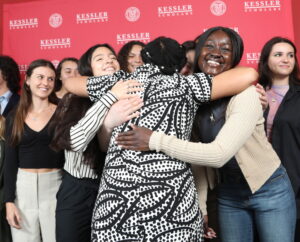(May 15, 2023 | Ann Arbor, MI) When he started college at the University of Michigan in fall 2019, Herik Garcia was among the more than a third of undergraduate students who are the first in their family each year to enter college. However, students like Herik too often are in the minority of those who graduate. Just 27 percent of first-generation students complete a bachelor’s degree in four years. The COVID-19 pandemic that unfolded during the first year of college for the Class of 2023 further exacerbated the challenges that those from limited-income and first-generation backgrounds traditionally face.
But Herik, who graduates this spring with an undergraduate degree in business, shows us that first-generation students are well-positioned to thrive at four-year institutions nationwide with comprehensive support and opportunities to bring their distinct experiences and skills to the classroom. This graduation season, more than 70 first-generation students across five institutions will reach the college finish line with holistic, cohort-based support from the Kessler Scholars Program.
Across five of our inaugural partner institutions, 75 Kessler Scholars this spring will become the first in their family to earn a four-year degree. They defy national statistics that show first-generation college students persist and graduate at far lower rates than non- first-generation peers.
Our model has provided these students with individualized support and programming to foster their academic, professional, and personal growth. They also benefit from proactive, personalized advising from staff and peer mentors and cohort-based activities throughout their college experience, reinforcing their sense of belonging.
Early results from the program’s inception at the University of Michigan indicate it can be a blueprint for campuses nationwide. The first Kessler Scholars cohort to complete the four-year program at Michigan attained an 83 percent four-year graduation rate in 2021 —exceeding their first-generation peers (75%) and matching their continuing-generation peers (84%). As of this spring, 94 percent of that initial cohort has earned a bachelor’s degree.
Building on that early promise, we launched the Kessler Scholars Collaborative in 2020, including diverse campuses like Cornell University, Johns Hopkins University, Queens College, St. Francis College, and Syracuse University. This spring, the first full cohort of Kessler Scholars at Cornell will reach the four-year graduation mark, while Johns Hopkins and Syracuse also are celebrating early Kessler Scholars graduates at their respective institutions.

The first graduating cohort of Kessler Scholars at Cornell University celebrate with program leadership and, above, with Cornell President Martha E. Pollack. (Photos courtesy of Cornell University.)
One of those graduates is Olivia Gurfinkiel, who will start as a strategy consultant at Ernst & Young-Parthenon after her time at Cornell. She credits the internship experience she received with guidance from the Kessler Scholars Program along with broader individualized advising for demystifying each step of her academic and professional journey.
Across the Collaborative’s inaugural partners, 75 students like Olivia are expected to become the first in their family to earn a four-year degree this spring. They defy national statistics that show first-generation college students persist and graduate at far lower rates than non- first-generation peers.
This fall, we are excited to welcome more than 400 first-generation Kessler Scholars to the network. In addition to our initial partners, 10 American Talent Initiative (ATI) members that joined the Collaborative in 2022 will expand the promise of a bachelor’s degree to their first Kessler cohorts of limited-income, first-generation students this fall. It’s inspiring to see the model emerge at small Midwest colleges like Centre College, University of Dayton, and Saint Mary’s College (IN); public anchors like The Ohio State University, University of North Carolina at Chapel Hill, University of Pittsburgh, and University of California, Riverside; and highly selective colleges like Bates College, Brown University and Washington University in St. Louis.
Each of these institutions received a $1 million grant from Bloomberg Philanthropies and the Judy and Fred Wilpon Family Foundation to adopt the Kessler Scholars model over the next four years and accelerate progress across student success measures; not just graduation rates, but also belonging and engagement in campus experiences, leadership opportunities, and community service. It’s important that first-generation students nationwide can benefit from this blueprint. Ithaka S+R will lead an external evaluation to track the outcomes of this national project, and ATI will help amplify this blueprint to its collective of 137 high-graduation-rate colleges and universities.
As Kessler Scholars like Olivia, Herik, and Lubna Azmi (Johns Hopkins University) cross the stage this month, becoming the first in their families to finish a four-year degree and begin promising professional journeys, we know it is possible to close the first-generation completion gap. Our nation stands to gain from the experiences and skills they’ll bring to the workforce and our communities.
Read student profiles of Olivia, Lubna, and Herik and click here for more information about the American Talent Initiative. This work would not be possible without the support of the Judy and Fred Wilpon Family Foundation and Bloomberg Philanthropies.

